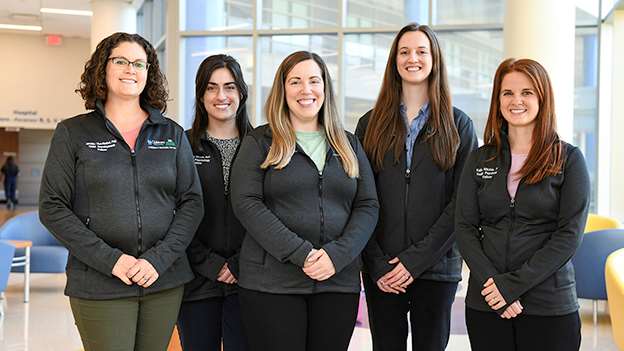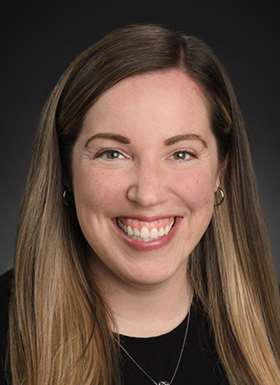Medical College of Wisconsin Pediatric Psychology and Developmental Medicine (PPDM) Postdoctoral Fellowship Program
This fellowship is designed to be a challenging and dynamic program that provides advanced training in evidence-based, developmentally appropriate, and culturally-sensitive clinical service, professional development, ethical decision-making, and scholarly inquiry.
The Pediatric Psychology and Developmental Medicine (PPDM) clinical postdoctoral fellowship program at the Medical College of Wisconsin (MCW) and Children’s Wisconsin (CW) provides advanced and specialized training in pediatric and clinical child psychology to promote professional development and prepare fellows for independent practice as psychologists who will contribute both to the welfare of society and to the profession.

About Our Institutions
Medical College of Wisconsin (MCW)
The Medical College of Wisconsin brings together the most inquisitive minds in science, medicine, education and community engagement to solve the toughest challenges in health and society today. Academic medicine is at the core, where scientists, physicians and students work hand-in-hand with the community to ask the questions no one else is and fuel the continuous cycle of knowledge that’s shaping the future of medicine.
Children’s Wisconsin
Children’s Wisconsin is the region’s only independent health care system dedicated solely to the health and well-being of children. We offer a wide range of care and support for children of all ages. Our services include medical care, dental care, child and family counseling, foster care, adoption, social services, child advocacy and injury prevention.
PPDM Postdoctoral Fellowship Program Tracks

PPDM Postdoctoral Fellowship Didactics & Supervision
Fellows will receive a minimum of two hours of supervision per week from a licensed psychologist on faculty. Supervision is focused on clinical care, scholarly work, and career development. Additionally, once monthly fellows will have an opportunity to participate in peer supervision facilitated by a faculty psychologist. The purpose of this group supervision is to spend time discussing a variety of issues, while also fostering a sense of community, building relationships, and increasing socialization across the team. The focus is often on emergent interprofessional issues and relevant case discussions.
Fellows are expected to work closely with and provide supervision to other trainees (e.g., practicum students and psychology residents). Twice annually the fellow will facilitate case presentations given by the practicum students. Fellow will also present a didactic seminar to practicum students as part of their training program.
Fellows will receive approximately one hour per week of didactics between the months of September and June. Seminars will cover professional development topics, supervision, ethics, and diversity, equity, and inclusion topics. Each fellow will present twice during their training year. Training tracks may offer additional didactic opportunities, in addition to those offered through MCW and CW.
PPDM Postdoctoral Fellowship Program Details
Application Process
Qualified applicants will have graduated from an APA-accredited graduate program in clinical, counseling, or school psychology. Applicants must have their doctoral degree conferred prior to the start of the Pediatric Psychology and Developmental Medicine Fellowship Program. Children’s Wisconsin & the Medical College of Wisconsin encourage applicants from under-represented minority groups, women, and those with disabilities to apply.
Interviews will be conducted via a video platform. Applicants who do not meet required qualifications will not be considered for an interview and will be provided with proper notice. Interviews will be offered to applicants based on meeting qualifications and being identified as a good fit for the Fellowship. Notification of interview status will be given no later than January 1.
The application deadline is December 1.
Email completed applications to:
Jenna Ditch | jditch@mcw.edu
Educational Program Coordinator
Pediatric Psychology and Developmental Medicine
Employment Eligibility Requirements
The Medical College of Wisconsin has eligibility requirements for employment. According to the Wisconsin Caregiver Law, any employer identified as a caregiver institution must conduct background checks. On background checks, applicants must disclose all crimes and offenses including all civil forfeitures, misdemeanors, ordinance violations, or fines. Applicants will also need to disclose any pending charges for crimes or offenses including civil forfeitures, misdemeanors, ordinance violations, or fines. Failure to disclose this information on your application or misrepresentation of a disclosure will be considered falsification and will remove you from eligibility for employment. Please refer to the Wisconsin Caregiver Background Regulations and the list of Offenses Affecting Caregiver Eligibility to determine disqualifying events. All disclosures will be evaluated for relevancy to the job.
Required Qualifications
- Completion of a PhD or PsyD from an APA-accredited doctoral program in clinical, counseling, or school psychology
- Conferral of doctoral degree prior to start of fellowship
- Internship/residency must be APA-accredited
- Strong core child clinical psychology psychotherapy and assessment experience
- Substantial experience in pediatric health psychology during internship/residency for those applying to any of the pediatric health psychology positions (i.e., Functional Disorders, Adherence, Hem/Onc/BMT, Adolescent Health, Orthopedics)
- Substantial experience in assessment of children with learning or developmental disabilities for those applying to the School Performance and Autism fellowship positions
- Interest in pursuing a career in child clinical or pediatric health psychology
Required Materials
- Cover letter specific to each track to which you are applying
- Curriculum vitae illustrating past clinical and research experience
- Three letters of recommendation. One must be from Internship/Residency Training Director. You may use the same letters of recommendation for all tracks to which you are applying.
EPPP Support
The program values the fellow's transition from fellowship into independent practice. As such, fellows will have access to support for studying for and completing the EPPP. The following EPPP support is available to each fellow:
- Funding to purchase online access to EPPP practice exams through AATBS
- Financial support for EPPP registration and Wisconsin state license fees
Stipend & Benefits
Clinical fellowship appointments are full-time (average 40-hour week) for one year. Our clinical fellows acquire 2,000 supervised hours during the training year to qualify for state licensure requirements.
Fellows receive a salary that is competitive and exceeds NIH fellowship guidelines. Benefits are robust and include health, dental, vision, and disability insurance. Funds for conference travel are available. Fellows are granted 20 days of vacation per year.
Meet the PPDM Postdoctoral Fellowship Director | Jenny Hoag, PhD
 Dr. Hoag is an accomplished pediatric psychologist, holding a BA in Psychology from the University of Northern Iowa and a PhD in Clinical Psychology from the Illinois Institute of Technology. Her training included a pre-doctoral internship in Child Psychology at Schneider Children’s Hospital and a fellowship in Pediatric Psychology at the Medical College of Wisconsin. Since then, Dr. Hoag has developed a robust academic and clinical career at the Medical College of Wisconsin, where she currently holds the position of Professor in the Department of Pediatrics and the Department of Psychiatry and Behavioral Medicine. She is dedicated to preparing psychology trainees for the next step in their career by fostering clinical competency and encouraging independence, self-care, and flexibility. Dr. Hoag was selected as the first Fellowship Director for the Division of PPDM and aspires to continue to grow the program in the coming years.
Dr. Hoag is an accomplished pediatric psychologist, holding a BA in Psychology from the University of Northern Iowa and a PhD in Clinical Psychology from the Illinois Institute of Technology. Her training included a pre-doctoral internship in Child Psychology at Schneider Children’s Hospital and a fellowship in Pediatric Psychology at the Medical College of Wisconsin. Since then, Dr. Hoag has developed a robust academic and clinical career at the Medical College of Wisconsin, where she currently holds the position of Professor in the Department of Pediatrics and the Department of Psychiatry and Behavioral Medicine. She is dedicated to preparing psychology trainees for the next step in their career by fostering clinical competency and encouraging independence, self-care, and flexibility. Dr. Hoag was selected as the first Fellowship Director for the Division of PPDM and aspires to continue to grow the program in the coming years.
In addition to her clinical and academic roles, Dr. Hoag is a dedicated researcher, currently leading projects that explore innovative interventions to enhance the well-being of children undergoing cancer treatment. Her research includes the use of virtual reality to increase physical activity among youth with cancer and investigating health-related quality of life among pediatric hematopoietic stem cell donors. Her work has culminated in presentations at the national and international level and over 20 published papers. She has been recognized with multiple awards, including the Children’s Specialty Group Excellence in Professionalism Team Award and the Survivorship Champion’s Prize. Dr. Hoag is actively involved in numerous professional organizations, including the Society of Pediatric Psychology of the American Psychological Association and the American Psychosocial Oncology Society, where she currently serves as Co-Chair of the Pediatrics/AYA Special Interest Group. As a member of several advocacy groups, she is committed to advancing psychosocial oncology and improving care outcomes for children and adolescents facing cancer.
2025-2026 PPDM Postdoctoral Program Fellows

Sarah Boeding, PhD
Hematology/Oncology/Blood and Marrow Transplant Track
Pre-Doctoral Internship, Medical College of Wisconsin | PhD, Marquette University | MS, Marquette University

Sweta Bose, PhD
Center for Child Development – Autism Track
Pre-Doctoral Internship, Groves Learning Organization | PhD, University of Minnesota, Twin Cities | MA, University of Minnesota, Twin Cities

Abigail Brandenburg, PhD
Center for Child Development – School Assessment Track
Pre-Doctoral Internship, C.S. Mott Children’s Hospital, University of Michigan | PhD, University of Wisconsin-Milwaukee | MS, University of Wisconsin-Milwaukee

Ellison Choate, PhD
Functional Disorders Track
Pre-Doctoral Internship, Medical College of Wisconsin | PhD, Palo Alto University | MS, Palo Alto University

Meena Chockalingam, PhD
Consultation/Liaison and Pediatric Psychology Track
Pre-Doctoral Internship, Dell Medical School, Dell Children’s Medical Center | PhD, Illinois Institute of Technology | BA, Monash University

Brent Tuescher, PsyD
Orthopaedics & Sports Medicine Track
Pre-Doctoral Internship, Hazelden Betty Ford Foundation | PsyD, Wisconsin School of Professional Psychology | MS, Wisconsin School of Professional Psychology
Program Graduates
2024-2025
- Kimberly Brown, PhD
- Eliza Godfrey, PhD
- Katie Ritchie, PhD
PPDM Postdoctoral Fellowship Core Faculty

Andrea Begotka, PhD
Associate Professor


Kristin M. Bingen, PhD
Professor; Psychology Program Director







Jennifer A. Hoag, PhD
Professor of Pediatrics


Jeffrey S. Karst, PhD
Associate Professor of Pediatrics


Jennifer LeNoble, PhD
Assistant Professor of Pediatrics



Patricia Marik, PsyD
Associate Professor of Pediatrics

Stephen J. Molitor, PhD
Assistant Professor of Pediatrics




Jacquelyn J. Smith, PhD
Assistant Professor of Pediatrics

Nicholas D. Young, PhD
Assistant Professor
PPDM Postdoctoral Fellowship Accreditation & Licensure Requirements
Accreditation Information
Non-accredited. Questions related to the program’s accreditation status should be directed to the Commission on Accreditations:
Office of Program Consultation and Accreditations
American Psychology Association
750 1st Street, NE, Washington DC 20002
(202) 336-5973 | apaacred@apa.org | APA Website
Licensure Requirements
Although a formal postdoctoral fellowship is not a requirement of licensure in Wisconsin (please see Psychology Licensing Requirements in Wisconsin, “455.04 Licensure of Psychologists”), the Pediatric and Clinical Child Psychology Postdoctoral Fellowship Program exceeds the requirements needed for licensure in Wisconsin by offering postdoctoral hours for licensure and EPPP support.
Reasons to live in Milwaukee
Contact Us
Pediatric Psychology and Developmental Medicine | Children’s Wisconsin | 8915 West Connell Ct., Health Psychology | Milwaukee, WI 53226


